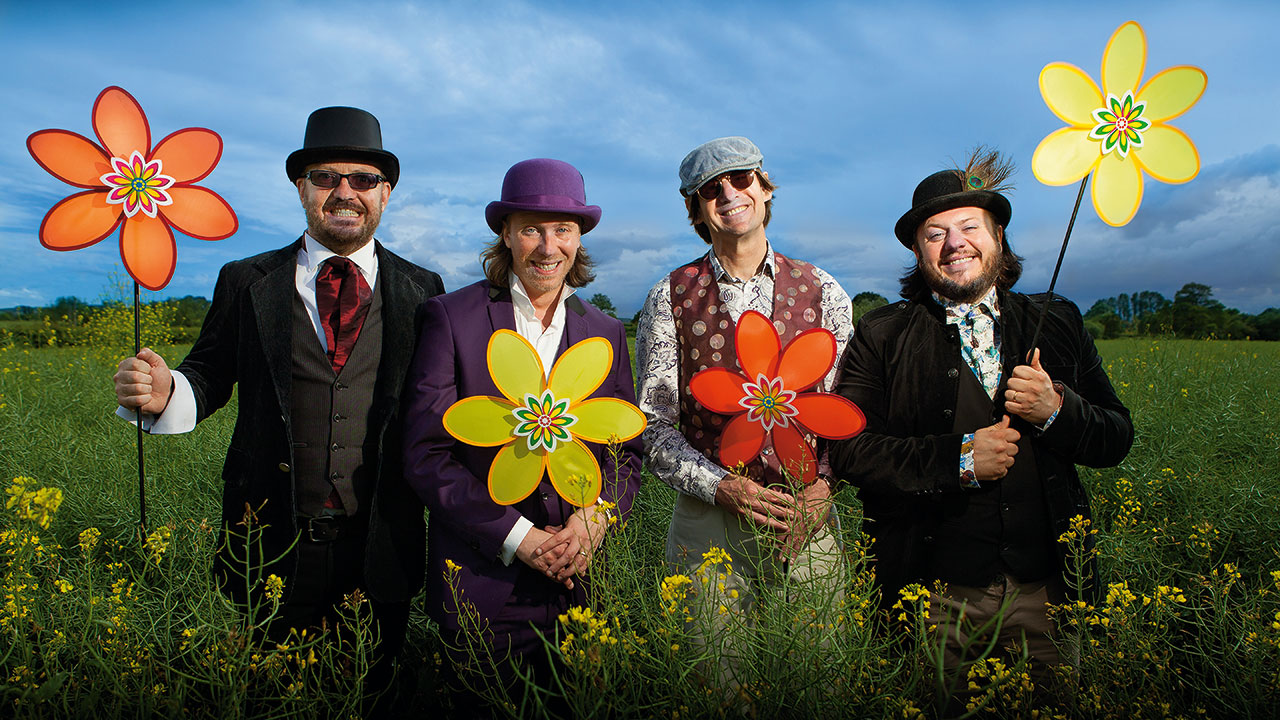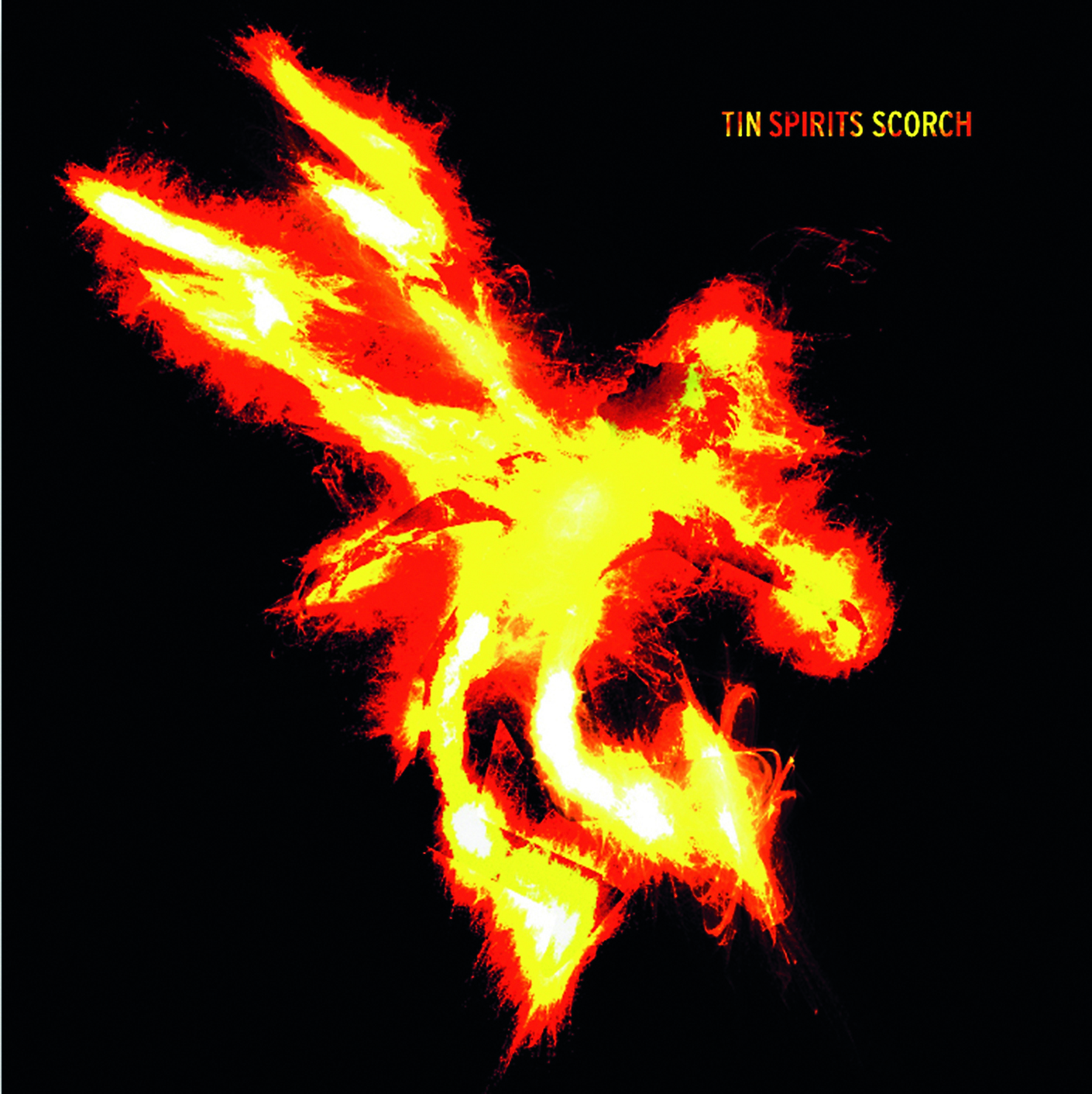
Bonded by a love of classic prog, when XTC’s Dave Gregory teamed up with three fans of his former band to create Tin Spirits, it was a marriage made in heaven. In 2014 they sat dow with Prog to tell the story of second album Scorch.
Dave Gregory spent 20 years with XTC. It was a tenure that produced some remarkable music, from the perky art-pop of 1979’s Drums And Wires through to the symphonic rapture of Apple Venus Volume 1 [1999], often made memorable by his inventive lead guitar lines.
Predictably, he was in demand as a session player after he quit. Offers came in from the likes of Peter Gabriel, Aimee Mann, Steve Hogarth and Porcupine Tree, to name but a few. Yet by 2006, work had started to tail off. His friend Daniel Steinhardt, the Australian-born founder of TheGigRig, designers of switching systems for amps and guitars, arranged an audition for Ray Davies.
“I didn’t get the job,” Gregory explains. “Around that time I’d also helped put together a Commitments-styled soul outfit with some old friends in Calne, in the hope that we could do some wedding parties and corporate events, but we just couldn’t get any work. Eventually the band folded and I virtually resigned myself to a life of semi-retirement.”
Then came a lifeline. In the summer of 2008, Steinhardt and his band, The Hi-Fidels, had booked a Swindon studio to record an ‘amp shootout’ video for TheGigRig. Gregory was invited along to take part. The session went so swimmingly that the four of them decided to meet up again for an informal jam soon after. By all accounts there was an immediate connection.
“The three of us had been playing together as The Hi-Fidels for a few years already,” recalls Steinhardt, “and we were all XTC fans. I was nervous when we played with Dave, but it was instantly apparent to me that something was going on. And everyone felt the same way.”

So they did the only logical thing they could do: form a new band together. Tin Spirits was the outcome. Comprising Steinhardt (guitar and vocals), Gregory (guitar), Mark Kilminster (bass and vocals) and Doug Mussard (drums), they set about covering the songs that inspired them the most. And what better way to toast their union than through prog?
“Genesis was the key to everything really, and also Yes,” says Kilminster. “Me and Doug became friends in the first place because we were talking about The Lamb Lies Down On Broadway. And Dave’s a huge fan of Genesis and all the stuff that goes with it. So there was this common denominator of prog that bonded us together.”
Tin Spirits started out playing gigs full of prog-centric covers. Chief among them were Genesis’ Back In NYC, Yes’ Roundabout and Radiohead’s Paranoid Android. Gregory also remembers attempting a medley of Frank Zappa’s Orange County Lumber Truck and Edgar Winter’s Frankenstein. And, of course, there was a fair helping of XTC tunes.
“We were all massive prog fans,” asserts Steinhardt. “For me, XTC were very progressive. They were so adventurous with their sense of harmony, yet they were still accessible. And I loved that. One of the things about doing covers was seeing what Dave and I could do with the guitars. When we did Roundabout, for example, we would sit down and really pick apart all the harmonic synth parts and textures and get those ideas and melodies across just using guitars. It was crazy fun. There was no ambition with it, no predetermined course.”
Early Tin Spirit gigs were exuberant affairs. The setlist, which also extended to Jeff Buckley, alongside Steely Dan’s Bodhisattva, had everyone rapt, punters and players alike. “The thought of being able to go out and do Roundabout or Back In NYC was amazing,” says Kilminster. “You have to pick your places and nights, but that was like living the dream for us. It wasn’t until we’d done that for a while that we said, ‘Why don’t we have a go? Let’s see if we can write some stuff together.’ And that’s what happened with Wired To Earth.”
Issued in 2011, debut album Wired To Earth was a natural extension of the band’s reach. There was one concession to their live work (that aforementioned Genesis cover), but the rest of it was made up of original Tin Spirits songs, initially as an experiment to see if they could actually do it. With Kilminster taking the role of chief lyricist, Gregory and Steinhardt stuck tight to their directive of forgoing keyboards. One of the signature imprints of the record was the deft interplay between guitars, the tunes stretched out into elaborate arrangements and bathed in blushing melodies. Kilminster and Mussard proved themselves a formidable rhythm section, a fluid backline that added colour and richness to the sound.
For Steinhardt, it was the realisation of a very particular ambition: “I’m obsessed with guitar sound – it’s completely captivated me since I was a kid. I’ve always been a big XTC fan and Dave was my favourite guitar player in the whole world. I was just enthralled by what he did, ever since I first heard Senses Working Overtime. That was the first time I’d heard someone who I wanted to be like.
“Dave was someone who was virtuosic, yet completely subservient to the song. He just played exactly what the song needed. When we started Tin Spirits, I think he was at the point where there probably wasn’t a lot going on for him and he was wondering what he was going to do. He’s such a creative guy and he needs that outlet. Dave’s strength is as part of a unit – it’s where he shines.”
Gregory is only a little less effusive when it comes to saluting Steinhardt. “Meeting Dan was very important because he’d been a huge fan of XTC and wanted to see me doing something,” he offers. “It’s thanks to Dan’s enthusiasm and encouragement that I was persuaded to get my working boots back on. He has a real gung-ho, let’s-just-do-it attitude to playing music. And to life in general, for that matter.”
Wired To Earth was highly regarded by many who heard it (including this parish, who duly nominated it for a Prog Award). Here was a prog-leaning band who were unafraid of being tricksy and textural, even a little ‘difficult’, yet at the same time had a firm hand on the prerequisites of great songwriting.
Now they’ve gone one better. A long-overdue follow-up, Scorch, turns out to be worth the wait. It’s an album that makes good on the promise of Wired To Earth, while feeling far more assured and, if anything, more ambitious. So what’s been the big difference?
“Time!” states Gregory. “Wired To Earth was rushed, because we wanted it finished ready for our gigs with Marillion in the spring of 2011 [Tin Spirits supported the prog heroes in front of 3,000 people in Port Zélande in Holland]. Now that we know how we sound as a band on record, and how we react to each other when we play together, we took more care at the writing and rehearsal stage. We all agreed beforehand that it made no sense to rush out a follow-up.”
It was clearly a wise move. The songs on Scorch are bigger and hungrier than those on Tin Spirits’ debut. Co-producer Mitch Keen and mixer Paul Stacey (of Oasis and Black Crowes vintage) certainly deserve to take a bow, but it’s also down to a growing confidence and maturity within the band. One of the standout tracks is Garden State, a consummate exercise in prog dynamics, all liquid tempos, harmonic tones and killer playing.
It’s a composition that Kilminster started demoing at home not long after the release of Wired To Earth. Over time it gathered more skins. “For some reason it put me in mind of some early Jack Bruce solo tracks,” Gregory recalls of first hearing it, “with a prominent parping bass and brittle guitar. So I put on my Chris Spedding hat and went to work with a Telecaster. When we started playing it together, more and more bits and pieces were added, many brought in by Mark as the weeks passed. Now it’s this over-the-top proggy epic that’s practically taking the piss!”
Old Hands, which was originally conceived by Steinhardt on a Martin acoustic while perched on the stairs of his old house, is another song that’s been through something of a transformation. “I had the idea that the melody, if it was doubled by a slide part, could be really nice,” he says. “So I went over to Dave’s house, he pulled out a slide and suddenly it’s like Jeff Beck playing on this tune. It was just incredible.”
The story neatly illustrates the sense of unity at the pumping heart of Tin Spirits. “The credits for the songs list all of us,” Steinhardt explains, “because they’d be completely different if any one of us wasn’t there. There’s synergy in the chemistry and we all recognise and value it.”
Kilminster concurs. “The whole thing about this album is it’s four blokes hitting stuff to the best of their ability,” he says. “We just do what we do and that’s what we sound like. The interplay between the two guitars is great. Dan and Dave have this sort of psychic ability to play together really well – they just seem to jigsaw together. That’s how we get away with being a prog band without keyboards. It shouldn’t be allowed really.”







